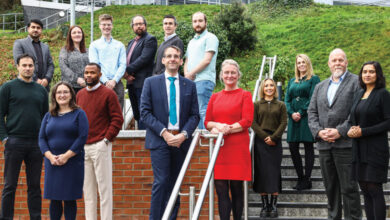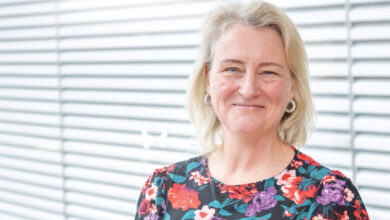Digital solutions designed to inform health care services and providers

Research and innovation in Scotland’s digital health and care ecosystem is about “supporting an environment which identifies, designs, and gets digital solutions ready for adoption by the other parts of Scotland’s health and care system”, says Digital Health and Care Innovation Centre’s (DHI) Moira Mackenzie.
 For over 30 years’ Mackenzie has been leading complex transformational change developments, enabled by digital within health, housing and care environments. DHI was established in 2013, and is a world leading collaboration between the Glasgow School of Art (GSA) and the University of Strathclyde. As deputy Chief Executive Officer, and Director of Innovation at DHI, Mackenzie leads senior stakeholder engagement, design, finance, communications and marketing functions to identify collaborative health and care opportunities where DHI can add the most value from its expertise in digitally enabled research and innovation.
For over 30 years’ Mackenzie has been leading complex transformational change developments, enabled by digital within health, housing and care environments. DHI was established in 2013, and is a world leading collaboration between the Glasgow School of Art (GSA) and the University of Strathclyde. As deputy Chief Executive Officer, and Director of Innovation at DHI, Mackenzie leads senior stakeholder engagement, design, finance, communications and marketing functions to identify collaborative health and care opportunities where DHI can add the most value from its expertise in digitally enabled research and innovation.
She emphasises that research and innovation in Scotland’s digital health and care system can help deliver sustainable services, develop future skills, help Scotland’s people live longer and healthier lives, help treat people with serious health issues (such as drug addictions), and enables the economy to meet global needs.
“DHI is part of a flourishing health and care ecosystem in Scotland, which involves many organisations and actors,” explains Mackenzie.
“There is a huge enthusiasm and commitment to introduce and expand digital solutions, as we are convinced that this is crucial to ensuring our health and care services are sustainable in a rapidly changing world.
“This bubbling enthusiasm is tempered by the recognition that to realise the greatest impact and meaningful change, we need to work together coherently, applying different skills and experience as part of a whole system approach. Although this remains a work in progress, we are improving rapidly.”
DHI is funded by the Scottish Government and the Scottish Funding Council (SFC) and while it is hosted by the University of Strathclyde and the GSA, Mackenzie emphasises that it is “very much a national organisation”.
Mackenzie states that she is not a “digital native”, but is comfortable to act as a proxy for people working in health and care services citing: “If I get it, and I understand where digital can make a real difference, I feel I can translate that effectively for service delivery colleagues as well.”
DHI’s priorities
The focus of DHI’s research and innovation is about “supporting an environment which identifies, designs, and gets digital solutions ready for adoption by the other parts of Scotland’s health and care system”.
Having secured ongoing infrastructure investment from the Scottish Funding Council, DHI were able to publish their 10-year strategy Transforming Great Ideas into Real Solutions, which identifies how the organisation will continue to identify and develop digital solutions to better meet people’s needs. The strategy identifies the following seven priority action areas:
- Support the transformation of health and social care.
- Develop a digital and data infrastructure as national assets to de-risk innovation.
- Enhance Scotland’s connected ecosystem through cross sectoral innovation clusters.
- Develop a future skills pipeline which delivers workforce capabilities fit for Scotland’s future.
- Extend commercial engagement to support economic growth.
- Support health and care contribution to net zero.
- Enhance Scotland’s international reputation in research and innovation.
Moreover, Mackenzie states: “Over the past 10 years, DHI have iteratively developed our innovation process model method, which underpins all of our activities and we have built a team which deliberately blends very different capabilities – programme management, skills development, technical ideation and prototyping, direct experience of health and care service delivery (our CEO was a GP), and participatory design expertise.”
She adds: “Our partnership with the Glasgow School of Art has been instrumental in identifying and designing digital solutions to better meet people’s needs.”
Digital Lifeline Scotland
Mackenzie speaks passionately about one of DHI’s large scale programmes Digital Lifeline Scotland, a £3.1 million four-year programme funded by the Scottish Government which is designed to help address Scotland’s “unenviable position” of having the highest drug related deaths in Europe.
She states that the Universities of Stirling and St Andrews initially carried out research to explore what digital solutions existed in the world that could support people living with drug related addictions. They found that there were not many or were in their infancy in terms of development.
“The programme engaged with service providers and people with lived experiences to understand their individual challenges and seek their input about how digital might help them, and what key needs and challenges people living with drug addictions were trying to address in their lives,” Mackenzie explains.
These insights then informed the first phase of the DLS programme with an associated evaluation carried out by Drugs Research Network Scotland and further enhanced by DHI’s Discover and Define Report, published in February 2023. This states: “People who use drugs want relationship-based services where they are an active decision maker and lived expertise is integrated at all levels. People need a ‘no wrong door’ approach where all services can be accessed through one point and there is timely and flexible access.”
It also states that people need access to mental health support, and want a holistic approach to their support based on building confidence and routine.
Furthermore, the report emphasises that services need to work with people to address underlying reasons for using drugs, exploring holistic and non-clinical formats of support and that services need to address stigma by embedding awareness through all services that engage with people who use drugs adding: “Services have opportunity to use digital solutions to enable sharing and joined up working and provide softer or flexible forms of access.”
Finally, the reported urges for the need to support services to “enable integrated care that uses person-centred, trauma informed and human rights-based approaches to support individuals on their own, unique journeys to living well”. The report also states the need to look at working across traditional services boundaries to enable collaboration and knowledge exchange learning around digitally enabled services.
Mackenzie cites updated figures at the end of October 2024 from the delivery phase of the Digital Lifeline Scotland programme which shows that nearly 4,500 people have now been digitally included by the programme and that there are nearly 450 staff and volunteers upskilled in digital approaches. Mackenzie notes that the programme finds that many people living with drug addictions have little experience of using digital devices even if they have them, are unlikely to have reliable data connectivity due to affordability issues, effectively excluding them from many support services and family.
In addition to DHI’s local Scottish collaborations, Mackenzie says that DHI is keen to collaborate with partners nationally and internationally, and that the example of the Digital Lifeline Scotland programme is featured within partnership bids with Northern Ireland as part of Peace Plus Programme proposals.





